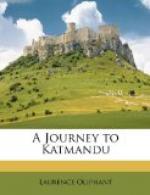Daylight, however, revealed a prospect which banished at once the remembrance of our nocturnal annoyances. The whole of the Himalayan range, tinged by the glowing rays of the rising sun, displayed to our delighted and astonished gaze its long and majestic line of snowy peaks, while the atmosphere, cleared by the night’s heavy rain, brought out in bold relief the sharp outline of every point and angle from the clear horizon-line of the various summits down to where the light morning haze still shrouded their base.
Unobscured by intervening mountains, and towering high above a sea of mist, well may they impress with wonder and admiration the traveller journeying over the plains of India, as he beholds them for the first time; nor could I, familiar as they were to me, withdraw my gaze until the increasing power of the sun rendered the atmosphere more hazy, and gradually veiled this glorious picture from my view, as if it were too precious to be exhibited for any length of time.
The journey to Goruckpore occupied us two nights and a day of incessant travelling over a flat but cheerful-looking wheat country. It is a pretty little station, containing a regiment and a few civilians, and is situated on the banks of the Rapti, our old Nepaulese acquaintance under a very different face.
The Gograh, which we crossed the following morning, is the boundary that divides the British territory from that of his Majesty of Oudh; and Fyzabad was the first town in his dominions at which we halted. Situate about six miles from the river, it is approached by a narrow muddy lane which winds among numbers of squalid huts, while a considerable sprinkling of handsome mosques and minarets showed the predominance of Mahomedanism in the country in which we were now travelling; but they all seemed falling to decay, and were inhabited chiefly by Hindoo monkeys, who lazily inspected one another on the sunny corners of some ruined temple, or chased each other irreverently through the sacred groves.
Fyzabad was formerly the capital; but the seat of government was changed to Lucknow at the accession of Azof-up Dowlah in 1775.
We were not sorry, after spending another twenty-four hours in our rickety palanquins, to see the massive mosques and lofty minarets of Lucknow looming in the distance, while handsome buildings in varied styles of architecture gave to this city a handsome and more imposing appearance than any I had yet visited in the provinces of India.
We had been so much delayed by the weather, that we missed seeing the wild-beast fight, which was just concluded as we entered the town. This was not so much to be regretted however, since, from all we heard, it had on this occasion proved a tame affair, though it is often most exciting. The fight between the buffalo and tiger seemed to have caused most interest, but the unfair practice of blunting the horns of the buffalo was not congenial to the fair-play feelings of the British portion of the community. Those who have witnessed a combat between a hyaena and a donkey, however, say that it exceeds in its ludicrous interest any other of these animal encounters; the donkey (as is natural) possesses the sympathies of the spectators, and usually comes off victorious.




